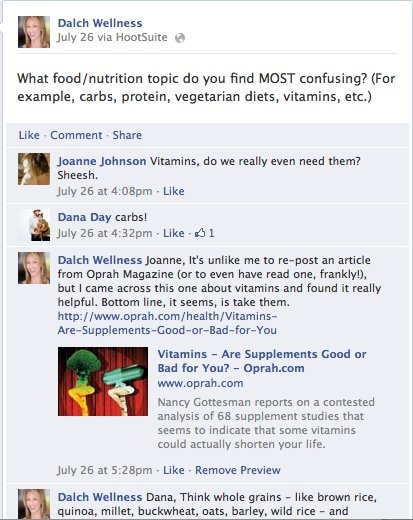On the Dalch Wellness Facebook page last week, I asked “What food/nutrition topic do you find most confusing?”. The most talked about response was vitamins – to take or not to take?
Yeah, I’m confused too! Even those of us who “do nutrition” for a living – including a dietician/nutritionist friend of mine whose opinion I recently asked – are perplexed by this issue. Should we take vitamins at all? If so, should they be in liquid or pill form? (From what I read, it doesn’t make much difference.) Should I take just a multivitamin or should I add other stuff too? (Well, that depends.)
I did a little digging and came up with a few do’s and don’t’s to think about as you make your vitamin decisions.
Don’t…
- Feel pressured to take or not take vitamins. Only you can decide what’s best for your body. Have a chat with people you trust – hopefully that includes a caring and accessible doctor – and dive in (or not).
- Freak out over recent research about vitamins being killers. Turns out the media latched onto some studies that were either poorly designed and/or produced misleading results, not the least of which was a link between mortality and vitamins. From what I read, it appears that there is more research supporting the use of vitamins than there is bashing them.
- Be overwhelmed by the amount of advice on both sides of this issue. Do your homework and make the best decision for YOU, just like you do when you make food choices each day. (Read on to see the source I found most helpful.)
- Get sucked into thinking that a single choice – like taking or not taking vitamins – will either save or kill you. Health and nutrition are complex issues that even doctors and scientists don’t quite understand. One thing on which everyone seems to agree is that your health is a result of LOTS of choices and LOTS of factors, some within your control and some totally out of it.
Do…
- Get as many nutrients as you can from fresh, whole foods. Your best source of vitamins is indisputably food. If you’re eating a balanced diet of whole foods – whole grains, fruits, veggies, lean proteins, etc. – you may not need much more than a basic multivitamin.
- Take a minimalist approach to vitamins. You probably don’t need to spend money on every “hot new” supplement on the market. Most of the articles and research I read suggest only a multivitamin plus a calcium/vitamin D supplement for the majority of women. Your M.D. or N.D. can advise you if you need to be taking anything else.
- Keep a food diary for a week or so to identify gaps in your nutrition and discuss it with your doctor, health coach, or nutritionist.
- Be aware that some supplements can interact with certain medications. Talk to your doctor to avoid any problems.
- Ask your doctor to run a blood panel. If you’re concerned about vitamin deficiencies, your M.D. or N.D. can give you some guidance on recommended supplementation by doing some simple blood work.
- Take note of how you feel before and after you start and/or stop taking vitamins. I still believe that your body is your best source of nutritional information.
- Consider what you need from a supplement and do your homework. Vitamin and supplement consumption is a complex issue, one that I can’t possibly go into in sufficient depth here. Whether or not you take them – and which ones you take – will depend on a host of factors such as age, dietary habits, medical history, and health status. The most helpful source of information I found was ConsumerLab.com, an independent vitamin/supplement testing company. Their Multivitamin and Multimineral Supplements Review – which costs $15 without a full site membership – outlines results of independent tests of various supplement brands and also gives an in-depth overview of what to consider when buying vitamins and supplements. (One interesting thing noted in the review is that “you don’t have to pay a lot for quality.” Many low cost store brands – like women’s multis at Walgreens and Kroger – were rated as highly for contents and quality as were higher priced brands.)
And to answer your question, yes – I take a multivitamin. I also take fish oil (omega 3’s), calcium, and vitamin D on a semi-regular basis. My decision was based on lots of things, not the least of which was the advice of my primary care physician, whom I’ve been seeing for over a decade and trust implicitly. (I’m very lucky to have her.) Even though I’ve made this decision, I waiver…regularly. But my bottom line is this: Even for someone like me – who pays attention to what I eat – there are gaps in my nutrition caused simply by my busy lifestyle and by where I live. I’m guessing that everyone in Seattle could use a vitamin D boost, the best source of which is, yep, the sun.
What about you? Do you take vitamins? Which ones? What helped you make your decision? Share your story in the comments below.






